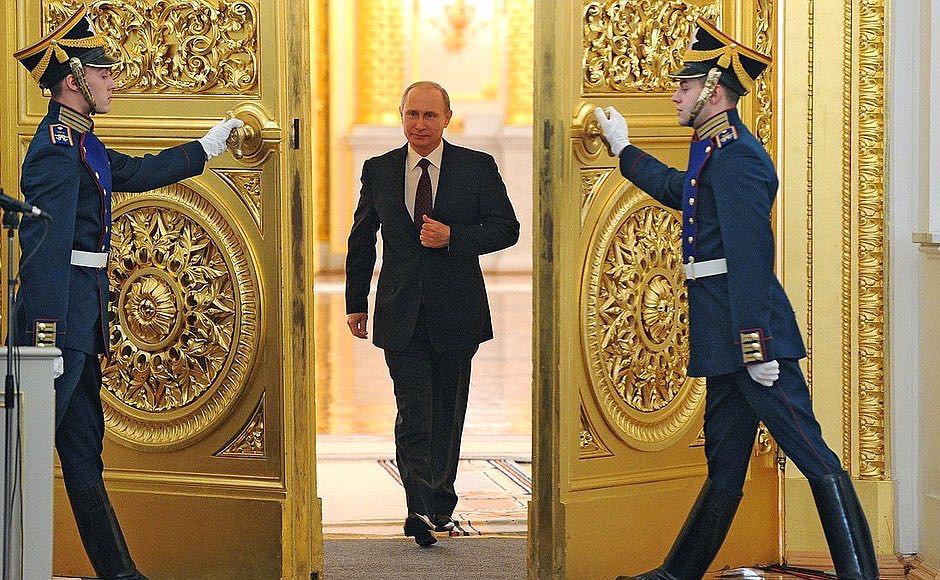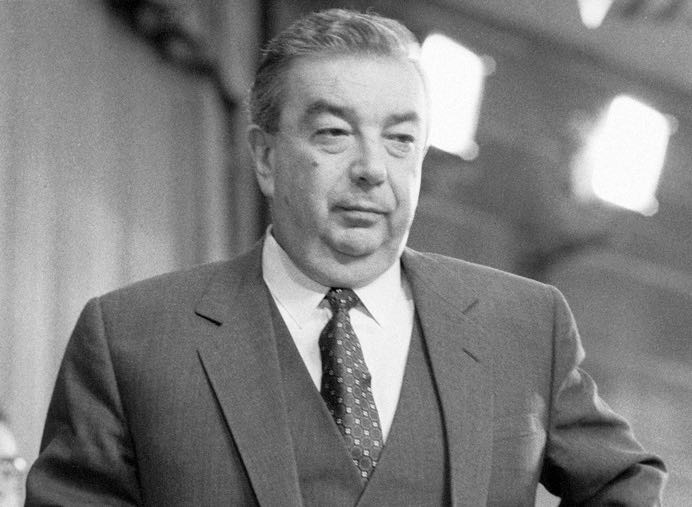It is an eternal discussion in East and West. Did the euforic West let down Russia after the collapse of communism? Could an offer of NATO membership have changed the course of history? No, says political scientist Igor Gretski for the website Riddle. The economic collapse of the 1990s quickly alienated the people from a choice for a western partnership. Public opinion returned to nostalgia of the past and political elites cynically used this to keep their power. And now conveniently blame the West.
 Putin's re-election in 2018 (picture Kremlin)
Putin's re-election in 2018 (picture Kremlin)
by Igor Gretski
One year ago, Riddle featured an article by Professor Ivan Kurilla that partially blamed the West for the collapse of democratization in Russia. In his view, Euro-Atlantic and NATO expansion 'ground to a halt at Russia’s edge' and functionally led to 'Russia’s de-facto "expulsion" from Europe'. Historian Sergey Radchenko recently made a similar point. With a constructivist view of international relations, he believes that US President Bill Clinton ignored Russia’s aspirations for joining NATO. Doing so, Clinton 'helped put the locomotive of Russian foreign policy on the track of confrontation with the West'. However, this analysis contradicts national polling data and some key historical facts.
The Russian public: NATO shall not pass!
Was Russia’s public even prepared to accept their country joining NATO in the early 1990s? The answer is no. According to a March 1991 poll with multiple response variants, 68% of respondents agreed that 'the USSR must follow the path of the developed West'. 44% said that the USSR has its own path of development. 42% said that 'humanity has only one path of development'.
More than anything, these results show the public’s confusion. Other studies also suggest this. For instance, also in spring 1991, only 21.8% of respondents positively viewed the expansion of economic ties with the West, one of Perestroika’s key accomplishments. In just a year, an April 1992 yes-or-no poll found that just 16% supported the Western path of development. NATO membership was seen as an inseparable part of the West, so the respondents’ feelings toward the alliance likely did not fare much better.
When the Soviet Union collapsed, the avalanche of economic difficulties that fell upon yesterday’s communist planners immediately dashed their hopes for a quick improvement in the standard of living. These hopes were replaced by nostalgia for 'Soviet stability'. Many lost faith in their ability to find a place in the new socio-economic system. Sympathy for the West faded just as quickly.
The first group of people to feel this disappointment were educated, older Russians who once supported Gorbachev’s reforms, but increasingly saw the West as an adversary amid the economic chaos. This is how former VTsIOM analyst Alexey Levinson explained it at the time: 'This demographic group’s acute difficulties in adapting to a market economy enabled the revival of our society’s traditional fear of the West.'
Without overcoming the symptom of post-imperial syndrome, for the Russians joining NATO was simply a non-starter
Russia’s elites could not simply ignore the country’s majority public opinion. This means that the 'window of opportunity' for preliminary talks on Russian membership in Euro-Atlantic institutions, as described by Ivan Kurilla, did not actually exist. Overall, it seems that a significant part of the population really did start to see the West in a positive light during late Perestroika. However, this sympathy could not quickly transform into a new 'Western' identity. In July 1992, 69% of Russians believed that Russia must preserve itself as a great power, even if doing so would worsen relations with the outside world. This is a clear symptom of post-imperial syndrome. Without overcoming it, joining NATO was simply a non-starter.
The Russian elites and domestic legitimacy
This is how Russian society entered the post-Soviet era: with an outlook firmly fixed on the past and with a hardening anti-Western mood. As then-Foreign Minister Andrey Kozyrev wrote in spring 1992, 'NATO is not Russia’s adversary, but this view is not shared by Russian society, and is totally alien to political and security elites'. The latter, of course, included those who truly believed in the possibility of a NATO attack, but the overwhelming majority simply took a pragmatic position by going with the flow of public opinion.
This pragmatism, and not an actual military threat, underpinned the security elites’ hostility to NATO expansion. Yevgeny Primakov pointedly noted this in the well-known Foreign Intelligence Service report on NATO: 'Public opinion in the Russian Federation has long been formed in the anti-NATO spirit, and it cannot change in an hour.'
The Russian public’s anti-Western mood, compounded by the planned economy’s collapse, proved to be a true gold mine of political capital that elites could rapidly exploit. Yeltsin’s inner circle doubtlessly understood this. This is why in August 1993, when the Russian president declared that he would not oppose Poland and the Czech Republic entering NATO, even such outspoken ‘Atlanticists’ as Andrey Kozyrev and Georgiy Mamedov pulled their hair and did everything in their power to retract their boss’s statement. As it turned out, the phobias and complexes of Homo sovieticus were ripe for exploitation in politics. Surrendering this card to opponents would have been a great political mistake.
Yeltsin got a dose of this reality after the parliamentary elections of December 1993, when the majority unexpectedly voted for Vladimir Zhirinovsky’s radically nationalist LDPR. This party called for recreating a neo-imperial, authoritarian model of government and viewed the West exclusively as an enemy. As Alexey Pushkov once said, 'if Kremlin rulers give up the theme of Russian greatness to the opposition, they risk switching places with the opposition very quickly'.
Yeltsin naturally had no plans to leave office. Therefore, his team constantly made use of great power rhetoric. Following the LDPR’s euphoric victory, the Kremlin started eagerly copying the party’s anti-Western slogans and incorporating them in official discourse. Immediately after the elections, in January 1994, Kozyrev held a meeting with his ambassadors. There he outlined two new strategic foreign policy priorities: the protection of Russian compatriots in former Soviet republics and the continuity of Russia’s military presence there. The Foreign Minister explained this with the danger of a 'strategic vacuum' being filled by 'unfriendly forces', meaning NATO. In the following days, Russia took a more hardline stance on Bosnia and Iraq. The Kremlin also threw direct accusations of global hegemony at Washington.
The Kremlin’s narrative did not return to anti-Western confrontation when 'it became apparent that Russia would not be able to join NATO', as Radchenko writes. Rather, it returned when Yeltsin saw his grip on power threatened. The Kremlin never seriously pondered the question of Russian NATO membership. In fact, there is not even one official strategy document that mentions joining NATO or the EU as a worthwhile foreign policy goal for Russia.
What Radchenko describes as Moscow’s 'desperate push for NATO membership' and 'willingness to contemplate alternative scenarios' were, in reality, displays of tactical duplicity in the Kremlin’s foreign policy. Russia presented the narrative of an end to confrontation with the West to improve its international image. To its domestic audience, on the other hand, Russia emphasized its great power status. This aptly explains the emergence of a self-contradicting foreign policy ideal: to 'be a normal great power'.
The West always rushing to the rescue
Ivan Kurilla writes that Western elites, seized by triumphalism, saw Russia 'as a defeated country' after the Cold War. It is hard to agree with this assertion. The majority of Western politicians were not bent on the Soviet Union’s destruction. On the contrary, Washington feared the risks and uncertainties of the post-Soviet status quo and did everything it could to save this geopolitical ‘Titanic’ from sinking. This is why George H.W. Bush backed Gorbachev’s unilateral nuclear disarmament initiatives, seeking to avoid the perception of Moscow’s unconditional surrender. Bush even went to Kiev in summer 1991 to try to slow down the Verkhovna Rada’s deputies from declaring Ukraine’s independence. The American president supported Mikhail Gorbachev until the last day of the Soviet empire’s existence. He only declared victory in the Cold War after the Soviet president resigned and his own reelection campaign began.
Why did America offer the Kremlin a hand in that case? When the Soviet regime started bulking under economic problems, Moscow’s ability to maintain control over its own nuclear arsenal became Washington’s top concern. This is why Western elites tried to prevent the disintegration of the world’s largest country and aid its internal political stabilization. And if NATO membership would guarantee Russia’s continued nuclear nonproliferation, I believe that the West would not hesitate too long in inviting Russia into the organization.
History shows that no international framework can contain a dictator’s appetite for power in a country entrenched in post-imperial syndrome
Even so, membership would not be a panacea for Russia’s political and economic problems. A conflict between the president and the parliament was brewing. Public opinion toward NATO was firmly negative. Under such conditions, initiating a substantive dialogue on Russian membership in NATO would not just have been pointless. It would have been very dangerous.
Ivan Kurilla’s suggestion that if Russia joined NATO in the 1990s then it would not have annexed Crimea or eviscerated its constitutional freedoms, therefore, seems unsupported. Being a NATO member did not restrain Turkey from intervening in Cyprus in 1974. History shows that no international institutional framework can contain a dictator’s appetite when he is bent on keeping political power and his country is entrenched in post-imperial syndrome.
 Yevgeny Primakov
Yevgeny Primakov
Citing Alexander Wendt, Radchenko writes that Russian self-identity in the early 1990s was determined in the struggle of two narratives that legitimized political elites: one of partnership and one of confrontation with the West. It is not entirely clear why he singled out only two. There were potentially more, and the Russian establishment could have chosen any of them to pursue their own legitimization.
There could have been a narrative of Russia as a leader of democratization in the post-Soviet space. Even Kozyrev sometimes voiced this idea. Another narrative could have applied Karl Deutsch’s vision of a 'security-community' to Russia and Europe. In other words, the Russian government could have pursued substantive Euro-Atlantic integration – not just on paper – by creating true democratic institutions and deep structural reforms. They could have done this regardless of the NATO and EU’s final verdict on Russia’s membership.
Yes, these modes of domestic legitimization would have been thornier and more difficult. But if Russian elites are so cynical to choose the most crude and simplest methods of legitimizing their power at home, then is it fair to blame the West for not being 'idealistic' enough toward Russia? If the Kremlin prefers to preach Russia’s great power status and shake its fist at Washington for domestic approval and electoral points, then it clearly is not the West’s fault.
This article was first published by Riddle Russia. Igor Gretski is political scientist, associate professor of the Faculty of International
Relations of Saint Petersburg State University
